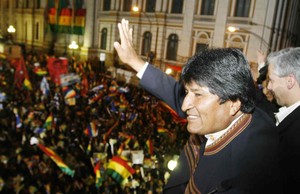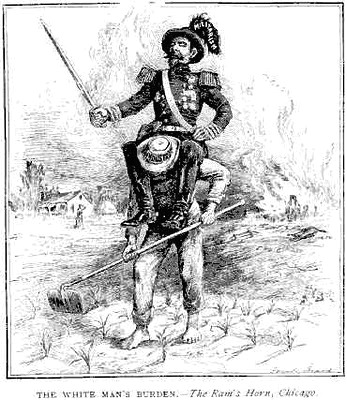Nov 20
20110
The International Campaign to Destabilize Bolivia
Bolivia CIDOB | Confederation of Indigenous People of Bolivia Imperialism Morales REDD TIPNIS USAID
Bolivia: Rumble Over Jungle Far from Over
Sunday, November 20, 2011 | Green Left Weekly
March from TIPNIS arrives in La Paz.
Despite the government reaching an agreement with indigenous protesters on all 16 demands raised on their 10-week march onto the capital, La Paz, the underlying differences are far from resolved.
On October 24, Bolivia’s Plurinational Legislative Assembly approved a new law banning the building of any highway through the Isiboro Secure National Park and Indigenous Territory (TIPNIS).
Many groups supported the highway, which would have connected the departments of Beni and Cochabamba, and provide poor rural communities with greater access to markets and basic services.
However, it was opposed by 20 of the 64 indigenous communities in TIPNIS. It became the central rallying point of the march led by the Confederation of Indigenous Peoples of the Bolivian East (CIDOB).
The march gained much sympathy, particularly among urban middle class sectors, after police meted out brutal repression against protesters on September 24.
Bolivian President Evo Morales immediately denied giving any orders to repress the protest. Apologising for the terrible event, Morales ordered a full investigation into the police attack.
Nevertheless, some important mobilisations in solidarity with the marchers were held in the days afterwards.
In response, government supporters took to the streets on October 12. Hundreds of thousands of indigenous peoples, campesinos (peasants), miners and neighbourhood activists from El Alto flooded the capital.
Having reached La Paz on October 19, march leaders sat down with Morales and government ministers for two days to reach agreement on their demands.
These demands ranged from opposition to the highway to land reform and the right of indigenous peoples to receive funds in return for converting forests within their traditional lands into carbon offsets.
It did not take long for the dispute to reignite, this time over the word “untouchable”, which was inserted into the TIPNIS law at the request of march leaders.
According to the government, the term “untouchable” required the immediate expulsion of all logging and tourism companies operating within TIPNIS, in some cases illegally.
However, march leaders who opposed the highway defended the industrial-scale logging within TIPNIS.
This includes two logging companies who operate more than 70,000 hectares within the national park and have signed 20 year contracts with local communities.
The government denounced the presence of a tourist resort within TIPNIS, equipped with two private airstrips to fly foreigners willing to pay US$7600 to visit the park.
Of this money, only $200 remains with local communities that have signed the contract with the foreign company.
Rather than defending some kind of romanticised “communitarianism”, much of the motivation behind the march was an attempt by community leaders to defend their control over natural resources as a means to access wealth.
The same is true of many of those groups that have demanded the law be overturned and the highway go ahead. Campesinos and coca growers see the highway as an opportunity to gain access to land for cultivation.
These differences underpin the divergent views regarding the new land law being proposed by campesino groups, but opposed by groups such as CIDOB.
The CIDOB advocates large tracts of land be handed over to indigenous communities as protected areas. Campesino groups are demanding more land be distributed to campesino families.
These differences have led to a split in the Unity Pact, which united the five main campesino and indigenous organisations despite longstanding differences.
This is perhaps the most important divisipn to have opened up within the Morales government’s support base. But is far from being the only one.
The TIPNIS march served as a pretext for opposition parties based among the urban middle classes to break down government support in these sectors.
On October 16, Bolivians took part in a historic vote to elect judges to the Constitutional Tribunal, the Agro-environmental Tribunal and Magistrates Council.
The corporate media used exit poll figures to announce that most had nullified their votes as opposition parties had called for. But the final result showed a different picture.
As votes from rural areas began to be counted, the supposed crushing victory for null votes was whittled away. The final results showed valid and null votes tying at 42%.
The opposition tried to turn the vote into a referendum on Morales.
Despite attempts to portray the null vote as a “progressive” protest vote against Morales, the results clearly showed that opposition to the election of judges was strongest in the right-wing controlled departments of the east and in the urban middle and upper class sectors.
In rural and poor urban areas, such as El Alto, valid votes overwhelming won out.
The null votes came from the same middle class sectors that came out onto the streets of La Paz in support of the indigenous march, and who spat out racist epitaphs against Morales and indigenous government supporters when they marched through the capital.
Meanwhile, territorial conflicts between various departments and local councils scrambling for resources and access to central government funding continue to provide headaches for the government.
Morales called a national summit for December to bring together the country’s social movements to collectively come up with a new “national agenda”.
The likelihood, however, of achieving consensus for a national development plan among competing social organisations, all with their own sectoral interests and who have seen that it is possible to twist the government’s arm by protesting, will no doubt be a difficult task.
[Federico Fuentes edits Bolivia Rising.]

